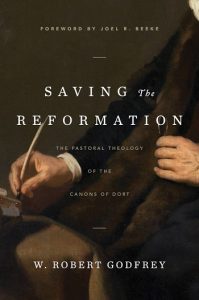 This month, April 2019, marks the four-hundredth anniversary of the completion of the Canons of Dort which were composed in response to the growing influence of the teaching of James Arminius (1560-1609) in what was at the time the Dutch Republic. The Canons addressed a document called the Remonstrance which included five points expressing opposition to the Calvinism of the Dutch Reformed Church. Last month, Greenville Presbyterian Theological Seminary held a conference in honor of the anniversary and had two publications about Dort available. The first, Saving the Reformation: The Pastoral Theology of the Canons of Dort, by W. Robert Godfrey, was published by Ligonier’s Reformation Trust this year. The pleasantly jacketed cloth-bound book includes sections about the historical and theological background of Dort, the Remonstrance, a new translation of the Canons from a pastoral viewpoint, and an exposition of the Canons. Included in the Appendices are a reassessment of Arminius by the author, a new translation of Dort’s statement on the Sabbath, and three other items. A great attraction of the book is it brings together the key items relevant to Dort in one binding for easy access and the accuracy of the translations and other content are assured by Dr. Godfrey’s scholarship. For those who are Presbyterians, Saving the Reformation would be a beneficial read for understanding how much the Continent and Britain have in common regarding Reformed theology.
This month, April 2019, marks the four-hundredth anniversary of the completion of the Canons of Dort which were composed in response to the growing influence of the teaching of James Arminius (1560-1609) in what was at the time the Dutch Republic. The Canons addressed a document called the Remonstrance which included five points expressing opposition to the Calvinism of the Dutch Reformed Church. Last month, Greenville Presbyterian Theological Seminary held a conference in honor of the anniversary and had two publications about Dort available. The first, Saving the Reformation: The Pastoral Theology of the Canons of Dort, by W. Robert Godfrey, was published by Ligonier’s Reformation Trust this year. The pleasantly jacketed cloth-bound book includes sections about the historical and theological background of Dort, the Remonstrance, a new translation of the Canons from a pastoral viewpoint, and an exposition of the Canons. Included in the Appendices are a reassessment of Arminius by the author, a new translation of Dort’s statement on the Sabbath, and three other items. A great attraction of the book is it brings together the key items relevant to Dort in one binding for easy access and the accuracy of the translations and other content are assured by Dr. Godfrey’s scholarship. For those who are Presbyterians, Saving the Reformation would be a beneficial read for understanding how much the Continent and Britain have in common regarding Reformed theology.
 The second publication is a reprint by Log College Press. The title is A Place Like Heaven: An Introduction to the Synod of Dort, which was written by Samuel Miller (1769-1850). I was a bit surprised by the title which was pulled from a quote of Bishop Joseph Hall (1574-1656) that was used by Miller. Dort was an assembly of godly men, but heaven is perfection. However, the pamphlet is classic Samuel Miller—methodical, precise, clear, and informative. If a brief but thorough read about Dort is desired, then this attractive booklet will be found helpful. Miller’s presentation includes the historical and theological context for the convening of Dort, its actions, and a good bit at the end as an apologetic for Calvinism. If you want to be more informed about the Synod of Dort and its work, one or both of these publications will be found beneficial.
The second publication is a reprint by Log College Press. The title is A Place Like Heaven: An Introduction to the Synod of Dort, which was written by Samuel Miller (1769-1850). I was a bit surprised by the title which was pulled from a quote of Bishop Joseph Hall (1574-1656) that was used by Miller. Dort was an assembly of godly men, but heaven is perfection. However, the pamphlet is classic Samuel Miller—methodical, precise, clear, and informative. If a brief but thorough read about Dort is desired, then this attractive booklet will be found helpful. Miller’s presentation includes the historical and theological context for the convening of Dort, its actions, and a good bit at the end as an apologetic for Calvinism. If you want to be more informed about the Synod of Dort and its work, one or both of these publications will be found beneficial.
Barry Waugh





